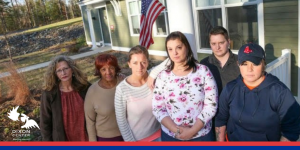 According to the US Department of Veterans Affairs, women made up 15% of the active-duty military force in 2015. Women are the fastest growing group among military and veteran populations. As more women serve in and eventually separate from the military, like all veterans, they seek continued opportunities to serve in successful careers, build community relationships, and maintain a comfortable lifestyle with their families.
According to the US Department of Veterans Affairs, women made up 15% of the active-duty military force in 2015. Women are the fastest growing group among military and veteran populations. As more women serve in and eventually separate from the military, like all veterans, they seek continued opportunities to serve in successful careers, build community relationships, and maintain a comfortable lifestyle with their families.
Like many of their male counterparts, countless female veterans will face seemingly impossible challenges to their hopes and goals. Female veterans are two to three times more likely to commit suicide than a non-veteran female. One in five is homeless, and 12.5% of female post-9/11 veterans are unemployed. And yet, these numbers scarcely tell the whole story of the unique circumstances female veterans encounter after military separation. In fact, female veterans are habitually missed in federal censuses.
Dixon Center saw the unique need of female veterans, creating the Female Veterans Program in 2014 to provide emergency relief for at-risk female veterans and their families by intervening and preventing crisis. We recognize the special healthcare needs, risk factors, and survival strategies these women have. Whether it was domestic abuse, divorce, loss of work, or high medical cost that was the final straw, Dixon Center’s jump start grants give female veteran recipients the hand up they need to achieve a level of comfort and security during a challenging time in their lives. We want to assure these veterans, like all others, they are not forgotten after leaving service.
“In a nut shell, because of the Female Veterans Program, an [in]surmountable amount of stress has been lifted from my life.” Julie sought assistance through Dixon Center when she suddenly faced a difficult medical diagnosis and was at risk of losing her only mode of transportation to and from appointments and treatments. A one-time grant, in addition to professional financial counseling, has allowed Julie to refinance her car, make reasonable payments, and still travel to her medical procedures as needed. It’s just one less thing on her plate.
Sometimes that’s all that is needed. Applicants can request emergency financial assistance for items such as food, infant supplies, or work-related clothing, or to be used for utility payments, gas and vehicle maintenance, or educational expenses.
But sometimes the need feels so much greater. Jasmine is a disabled combat veteran who served in Operation Iraqi Freedom from 2008 to 2009. Since her deployment she has had difficulty integrating back into civilian life. Jasmine suffers from PTSD, Major Depression Disorder, severe anxiety, and chronic bronchitis. She had been homeless since February 2015. That same year she had been undergoing intensive inpatient treatment and had successfully graduated in May 2016 from the VA’s Women’s Power Program. Jasmine felt ready to live on her own and hoped to complete her bachelor’s degree in Human Services. However, she also hoped to continue her care which required a relocation closer to the VA medical facility. It was through her application to Dixon Center that we were able to see a woman’s great desire to succeed in her own life and were able to offer aid.
“Because of [Dixon Center] I was able to regain my independence by moving into my own apartment. The assistance provided me the opportunity to continue my college education. I just completed scheduling my courses. Your program has given me a whole life and I will be eternally grateful. I would like to thank you on behalf of all female veterans. You give us hope!”
Each request for support is handled with the utmost sensitivity. The continual need for assistance among female veterans in this country is growing, though we progressively notice that female veterans are often to last to seek assistance. For many, the unforeseen challenges with reintegration into civilian life forcing female veterans into financial hardship is disheartening. Dixon Center’s Female Veteran Program seeks to empower personal, financial change so these women and veterans can begin to rebuild their individual solid foundation in life.
Learn more by visiting our Women Veterans Program page. With your help we can continue to engage organizations and communities to better connect with military families and veterans, like Jasmine and Julie, who seek meaningful employment, education, housing, and overall wellness. Click here to help us make a larger impact.